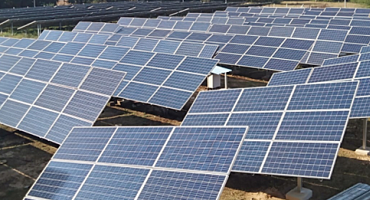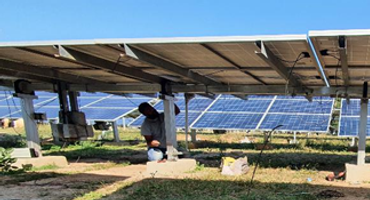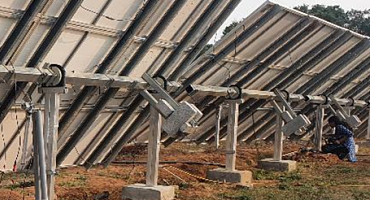Reliable movement with igubal pillow block bearings in solar trackers
Axiom Research Labs in Bangalore has developed an automated modular single-axis solar tracker (SPV) system for use on rooftops and in solar parks. By converting existing permanently installed systems to the "LEXSYS" tracker system, more energy can be generated in less space for Indian residential, commercial and industrial needs. To ensure that the daily tracking movement of the solar units works perfectly, the company relies on our robust igubal polymer pillow block bearings from the ESQM series - a "fit and forget" solution as they are maintenance-free during their entire 25-year service life.
- What was needed: pillow block bearings for supporting the square profiles that hold the solar modules
- Requirements: low friction, resistance to UV and corrosion, freedom from lubrication and maintenance
- Sector: renewable energies, photovoltaics
- Success for the customer: igubal ESQM pillow block bearings with a guaranteed service life of 25 years are the perfect alternative to metal bearings that require regular lubrication/maintenance and have a corrosion problem. The robust solid plastic joint bearings with low-friction spherical ball compensate for misalignments and enable permanent, easy movement without lubrication, corrosion or maintenance. Thanks to the split design, they are quick and easy to install.
igubal ESQM
Split pillow block bearings for square profiles, ensuring a long service life under high loadsTo the online shop
Free PV sample box
With a pillow block and flange bearing, plain bearings, a rod end and a half-shell for solar trackersOrder now!
Problem
Each module of the tracker system can consist of units containing 9 or 18 panels of 540 to 560 watts, which have an output of 5 or 10kW. The designers were looking for suitable bearings (two for the 9-panel units, three for the 18-panel units) to support the horizontal square profiles that carry the solar panels. The environment is a challenge for the bearings, as the system is exposed to high temperatures in summer, weather conditions such as wind and rain as well as dirt and dust. Braving these conditions was one of many other requirements placed on the bearings: they have to withstand the high loads of the entire tracking system - consisting of the panels, their supports and a corresponding counterweight - and at the same time have a low coefficient of friction. The bearings should be spherical and capable of absorbing heavy axial loads, allowing for quiet operation without torque fluctuations and featuring a service life of 25 years. All this ideally without lubrication and maintenance.Solution
The engineers initially considered lubricated metal and composite plain bearings, but then found the technically best and most cost-effective solution at igus: igubal pillow block bearings from the ESTM series, which were specifically developed for single-axis solar tracker systems. They consist of a housing made of igumid G, a particularly robust, long-fibre-reinforced polymer, and a very low-friction iglidur J4 spherical ball. In the igus test laboratory, the service life of the bearings reached 72 years at a load of 1.5 tons, simulated in a time lapse. That is why igus guarantees a service life of 25 years. The cost-effective pillow block bearings are UV-resistant, corrosion-free and require no lubrication, which makes them insensitive to dirt and completely maintenance-free. They also enable self-aligning, e.g. in the case of uneven grounds, and are quick and easy to install thanks to their two-part design. A true "fit and forget" solution that Axiom Research Labs is very happy with.

